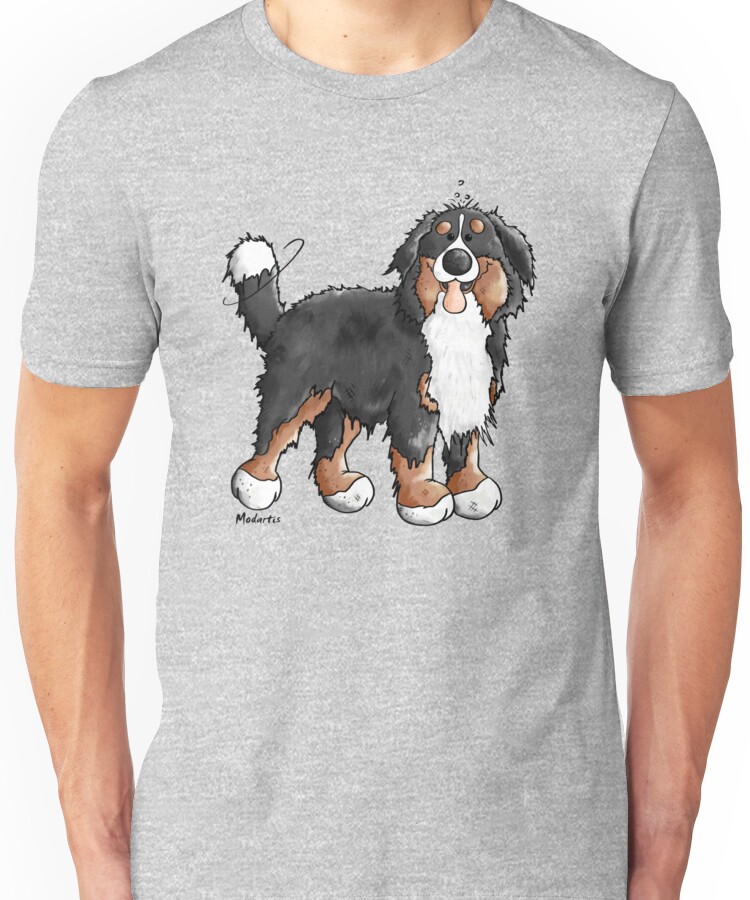Breed Type
In Australia Bernese Mountain Dogs belong to the Utility group but in many other countries they belong to the Working group of dogs.
History
Bernese Mountain dogs originated in Switzerland as farm dogs. In the early days these dogs were used as guard and protection dogs, draft dogs for milk wagons and as helpers to the Alpine herders. The Bernese is one of the four breeds of Sennenhunds which developed in different areas of Switzerland; the Bernese coming from the canton of Bern. They were first exhibited in Bern in 1902.
Description
Although the breed is always black, rust, and white, the extent of the markings can vary somewhat. They are a sturdy, balanced, large, strongly-boned dog. Dogs appear masculine whilst the females are distinctly feminine and generally smaller in size. They are intelligent, having the appearance of strength and agility suiting it to drafting and droving work in mountainous regions.

Size
A medium sized dog
Dogs range from 64-70 cm at the shoulder whilst the female ranges from 58-66cm at the shoulder.
Due to their large size training is important. They require gentle but firm and consistent training. If they are not trained or socialised owners may find themselves with a totally different dog to that described.
Coat
The coat is soft and moderately long, being either slightly wavy or straight and with a bright natural sheen. It requires regular brushing to maintain and keep it healthy. The dog will shed coat but regular brushing can help to keep this in check. In areas where there are grass seeds it is important to thoroughly check the coat for these as if left they may penetrate the skin and causes abscesses.
Temperament of the Bernese Mountain Dog
The breed is renowned as a self-confident, alert and good natured dog. It is fairly self-assured and friendly towards strangers. It is very good with people, children and other animals. They are very affectionate and loyal to their owners.

 Longevity
Longevity
The breed is not long lived and the average life span is 7 ½ - 9 years. Some dogs will not live this long and others have been known to live as long as 14 years. Genetics does seem to play some part in their longevity.
Health
The breed is prone to gastric torsion and owners should be aware of the symptoms if they are to assist in saving their dog's life.
See Animalinfo's fact sheet for further info - Gastric Dilation/Volvulus
Possible Genetic Disorders
- Entropian
- Hip and elbow dysplasia
- Histiocytosis
Best Suited
- Family with time to spend with their dog, people enjoying moderate daily exercise. Summer exercise should be limited to early morning and late evening to avoid overheating. If not exercised they may become destructive.
- Families wanting a good companion for themselves and their children.
- They are good with children and other animals.
- Families with a fenced yard.
Worst Suited
- Busy working people
- People not spending much time at home
- People who are very house proud and can not bear to have hair around the home
- Apartment dwellers
- Hot climates where the owner is unable to provide plenty of shade and water. Ideally they enjoy being in air-conditioning in extreme heat. Summer exercise should be limited to early morning and late evening to avoid overheating.
Recommended Reading
Bernese Mountain Dog: The Essential Guide for the Bernese Mountain Dog Lover (Breed Lover's Guides)
Bernese Mountain Dog: An Owner's Guide to a Happy Healthy Pet (Your Happy Healthy P Book 140)








